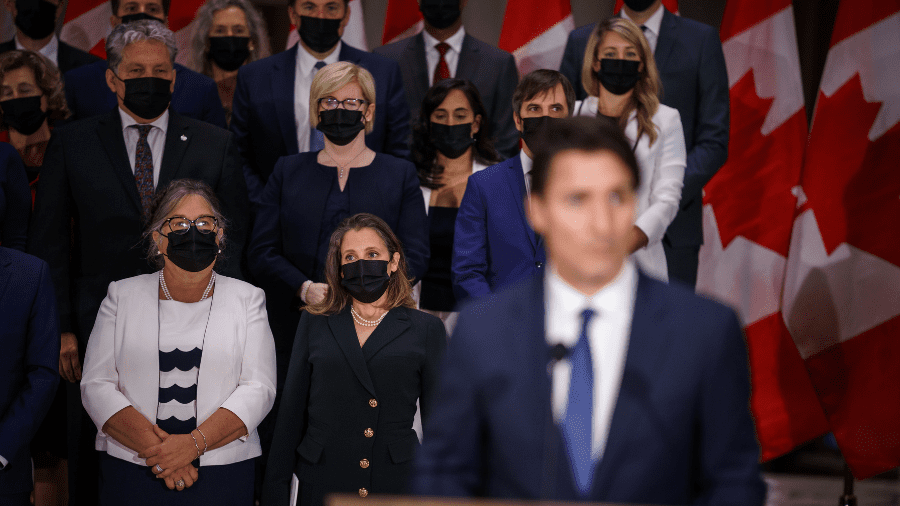This article originally appeared in the Hub.
By Peter Menzies, August 30, 2023
There is only one option left for rational people trying to make sense of Canada’s internet policies and the politicians who defend them.
That is to take disbelief and suspend it—ideally where it won’t interfere with the fictions swirling around the Online News Act like late summer wasps at a picnic table.
The act known as Bill C-18 is based on the assumed truth of the unproven allegation that Big Tech companies help themselves to the content produced by news organizations and refuse to share the profits they accrue from that larceny.
Always wobbly, that cornerstone assumption has turned out to be pure fantasy.
Into that category we can also place the perceptions of the prime minister, Justin Trudeau, the man who shepherded Bill C-18 through Parliament, Pablo Rodriguez, and the woman now responsible for the department from which Rodriguez recently fled, Heritage Minister Pascale S- Onge.
All three are clearly miffed that Meta opted not to be shaken down for hundreds of millions of dollars and chose instead to no longer accept links to news stories on its Facebook and Instagram platforms. First, St-Onge and Rodriguez demanded, in light of Yellowknife and Kelowna wildfire evacuations, that the web giant reverse its “reckless” decision to comply with the law by blocking news links.
When Meta failed to flinch, Trudeau, who is personally invested in this legislation, weighed in.
“Facebook is putting corporate profits ahead of people’s safety,” Trudeau said firmly upon returning from a family surfing vacation.
Meta’s actions, he added, were “inconceivable.”
To be fair, he probably believed that. After all, the government and those who lobbied for the bill (and at one point figured they’d be hauling in as much as $100,000 per journo as a result) still hold to the prayer that Meta is bluffing about getting out of the news business. They truly believe news is vital to Meta’s bottom line. It isn’t.
So by the end of August, Mark Zuckerberg’s California-based company had pretty much completed its shutdown of news on Facebook in Canada. Instagram is almost there and next comes Threads. While there’s no doubt some users are missing the presence of news links, Meta’s initial testing indicated Facebook was a happier place without them and the harassment and bullying complaints that they trigger.
The big takeaways, then, are not just that the government’s assumptions were and remain dead wrong, as illustrated by the prime minister’s insistence he is saving democracy and St-Onge’s intellectually fantastic walkabouts concerning non-existent exemptions in her own legislation.
No, the big ones are that Meta has comfortably passed the first test of ensuring that, in a crisis, it can still provide vital information without linking to news. In doing so, it has also revealed the harsh reality that journalists aren’t as important as they used to be or think they are.
In the 20th century world in which St-Onge, Rodriguez, and Trudeau remain anchored, first responders and other critical public safety officials depended heavily if not entirely on broadcasters to get the word out in an emergency. They were the primary intermediaries through which alerts and evacuation notices were transmitted.
They remain important partners over the airwaves, but those same news carriers are far less significant online, if at all. There, governments, police, firefighters, hospitals, etc. all have their own websites, Facebook pages, Instagram accounts, Twitter/X handles, comms teams—you name it—and can communicate directly to the public without assistance.
In addition, there are now emergency alert systems nationwide (the first was created in Alberta following the 1987 Edmonton tornado when some broadcasters failed to interrupt programming to issue warnings).
This is the harsh reality of which Trudeau, Rodriguez, St-Onge, and C-18’s most vocal proponents remain oblivious. The cold, hard facts are that Meta has smoothed its way through the early stages of its divorce from news. All information of importance during the evacuations was available wherever connectivity was possible and evacuees have been able to communicate their concerns and swap tips on Facebook in a fashion superior to anything legacy media can offer.
The next test will come if Google follows through on its threat to de-index news from its search engine.
The government, desperate to avoid that scenario, is already preparing to throw innovators under the bus to please legacy organizations while grasping for other face-saving ways to declare victory while in full retreat. Google insists that no matter what happens, access to vital information in emergencies will be unimpaired. This doesn’t mean people urgently looking for critical data will get directed to Global News or the Toronto Star. But, Google says, Canadians will be able to get everything they need straight from the sources, as has been the case so far with Meta.
News organizations will of course suffer heavy financial losses and the public will be further inconvenienced if Google joins Meta’s blockade. Citizens, though, will remain able to access local, national, and international news via apps, websites, and over the air.
The lesson that Trudeau’s government should have learned over the past few weeks is that the internet is not broadcasting. On the world wide web, information necessary to ensure public safety can be successfully relayed without the intermediary assistance or even the presence of the nation’s news hounds.
To see it otherwise is to exist in the world of make-believe within which this government’s internet policies have been conceived.
Peter Menzies is a Senior Fellow with the Macdonald-Laurier Institute, a former newspaper executive, and past vice chair of the CRTC.






